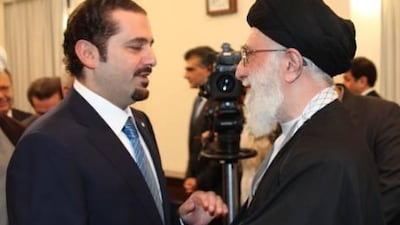It was ironic that the first batch of WikiLeaks revelations, which showed concern over Shiite-led Iran among Sunni Arab leaders, came as Lebanon's pro-western Sunni prime minister, Saad Hariri, was on an unprecedented trip to Tehran.
He was there to solicit vital Iranian support in keeping his fragile country stable as tensions soar in Lebanon over a potentially explosive United Nations probe into the 2005 assassination of his billionaire father, Rafiq Hariri, that is expected to implicate Hizbollah members.
Any such indictments, it is feared, will plunge Lebanon into sectarian violence or even civil war, which could have dire repercussions in the wider region.
Mr Hariri declared that his three-day Tehran visit, which ended on Monday, secured "good and beneficial political results" and he thanked Iran for its support. He provided no details.
But the implication clearly was that he had won Iran's backing for a well-publicised Lebanese peace initiative promoted by Syria and Saudi Arabia. Damascus is Tehran's only Arab ally, while Riyadh is Iran's main counterweight in the Arab world.
As Beirut's Daily Star put it in an optimistic editorial: "Regional regimes have far more in common than they do in opposition, when it comes to the good of Lebanon."
Under the headline "Hariri's prized gift from Iran", the newspaper added that the Lebanese prime minister had secured "an unqualified commitment to Lebanon's well-being".
Certainly, Mr Hariri's Iran venture should now make it easier for him to talk to Hizbollah, the militant Iranian-backed Shiite movement that is part of Lebanon's paralysed national unity government. The two parties have not been on speaking terms for several weeks. Effectively, by going to Tehran, Mr Hariri went over Hizbollah's head to talk to the organisation's main backer and paymaster.
Before travelling, he had sought a meeting with Iran's supreme leader, Ayatollah Ali Khamenei, but was not assured one. Significantly, it was only after Mr Hariri met Ayatollah Khamenei that Hizbollah's television station, Al Manar, made his visit headline news.
The ayatollah, who is revered by Hizbollah, claimed that there were good relations between the Shiite movement and Mr Hariri. But he urged them to work more closely together against Israel.
Having sought Iran's help, the Lebanese prime minister has cover to talk to other regional powers, primarily Arab states and Turkey, as well as the United States.
As one European diplomat in Beirut commented: "Mr Hariri has to keep everyone in Lebanon sweet right now."
Mr Hariri's trip, which was at Iran's invitation, was also a timely boon to the sanctions-hit Islamic republic before it resumes long-stalled nuclear talks with leading world powers next week. A key Iranian demand is that its interlocutors accept that Tehran has an important role to play in the region.
Iran has gamely attempted to dismiss the damaging WikiLeaks disclosures, which highlighted Iran's regional isolation, as an American and Israeli plot to sow divisions between the Islamic republic and its Sunni Arab neighbours.
In addition, Javanonline, an Iranian news website regarded as a mouthpiece of Iran's elite Revolutionary Guards, said on Tuesday that Mr Hariri had come to Tehran with Saudi Arabia's blessing and claimed that his visit "signifies the improvement in Tehran-Riyadh relations".
The website also maintained that Monday's assassination of an Iranian nuclear scientist, which Tehran has blamed on Israel, was designed to overshadow Mr Hariri's trip.
Iran's robust dismissal of the WikiLeaks disclosures as an American plot must have come as a relief to Mr Hariri. While he was in Tehran, the whistle-blowing website cited him urging the United States to stop Iran's nuclear programme.
Mr Hariri promptly denied he had done any such thing. At a news conference in Tehran on Monday, he said: "Lebanon… will never, ever consider itself as part of an international system which aims at pressuring Iran." The Islamic republic, he insisted, has the right to develop "peaceful nuclear technology".
Hizbollah's leader, Sheikh Hassan Nasrallah, has warned of dire consequences if the UN tribunal implicates any of his organisation's members, and has branded the tribunal an "Israeli project".
Hizbollah vehemently denies any involvement in Rafik Hariri's assassination, insisting it was on good terms with the former Lebanese prime minister and that his assassination served only the interests of Israel.
"Think about it," a Hizbollah official told Canada's Globe and Mail daily this week, "the last thing we would want to happen would be for the Shia to be accused of killing the Sunni leader of the country."
Hizbollah has been vigorously pressing for an understanding with Mr Hariri before the expected indictments are issued. The key to a solution is likely to be whether the Lebanese prime minister agrees to publicly accept that, if any Hizbollah members are implicated, he will absolve the movement's leadership of responsibility. That should become clear in coming weeks.

